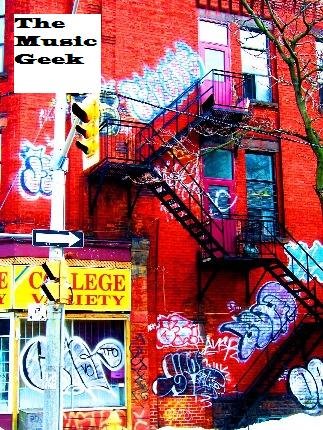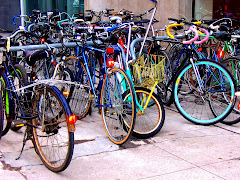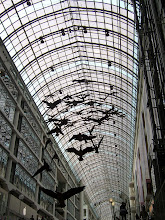TV on the Radio has been on the cover of Spin Magazine twice in the last two years. Death Cab for Cutie signed to a major label 2 years ago (yeah I know its not breaking news), and more and more bands from major labels who probably would not be bestowed with the title of "indie" ten years ago are being packaged as indie by the major labels (think the Killers, Embrace, Keane, etc). And what scares me the most is the new "cool" factor and "indie cred" associated with being able to rattle off a list of bands that no one in your social group had heard of in order to forge a music identity. However this list of bands is becoming increasing smaller as more and more indie bands climb closer to the mainstream The Shins, Arctic Monkeys, Bloc Party, Bright Eyes, Modest Mouse have almost lost their indie statuses. So with indie music becoming mainstream (if it really is at all or just a select few bands) what is the new underground music scene? or is there even such a thing as an "underground music scene" anymore? Can an indie music scene really even exist in the age of the Internet?
Starting when I was in 6th grade I always had a desire to listen to music that my peers were not listening to at the time. I discovered the Clash, Death Cab for Cutie and Bjork all within the span of the first year. My friends found my taste quite abrasive and strange (especially Bjork) however I always noticed that 3 years after I started listening to a band they would follow. So by the time I was in 9th grade they had started listening to Death Cab and The Clash and I had started listening to the Velvet Underground, Bright Eyes, Oasis, The Shins, Joy Division and more obscure bands (at the time...it was 2003/2004) like Nada Surf, Bloc Party, M83, The Faint, Ladytron, Ted Leo and the Pharmacists, Matt Pond Pa, le Tigre and more. I liked most of my bands (besides the Clash, Oasis and Underground etc) because they were unique and unheard of. I enjoyed finding new indie bands on obscure labels and adding them to my music collection, it became almost a game. And when I found a new musician I liked it was almost like finding a gem, it was something special and rewarding especially if I was one of the first fans. I guess throughout high school most would classify me as the stereotypical 'indie kid" I did listen to other genres but kept a strong hold on my indie music. As school progressed more and more of my bands gained a broader following. At first I was dismayed even going as far as to stop listening to their music (I did this to Death Cab for 2 years) or to exclude myself to only their older albums (Modest Mouse). However as soon as I left the hell that is high school and went to university I realized how petty my music discrimination had become. Why would I only limit myself to indie music in the first place? i soon discovered I enjoyed a variety of genres including classical and electronica and I could still enjoy them without giving up my taste in indie bands. I could even listen to...(GASP) POP MUSIC! And that's what I did, but getting back to the argument as I found more indie bands succumbing to major labels and the title of "selling out" I had to question the vary definition of "indie" itself. Although major labels were claiming these acts would still maintain their indie credibility it seemed like a contradiction to call a band indie at all when they had a large base of fans and a huge record deal. I mean U2 and REM were indie once too, they certainly aren't now.
The Internet made it easier for me to find bands in high school however with that said it also made it easier for indie label and unsigned bands to create a large following without costly promotion campaigns. Websites like MySpace and YouTube have allowed millions of people to access relatively unknown music quite easily (what I'm saying is nothing new I am aware of that). However it has also taken the effort out of finding new music, which is a good and bad thing. although indie bands get more exposure I also think it has helped devalue their music. Since no effort goes into finding the musician even less may go into acquiring the song or songs (think vidtomp3 or lime wire). Since musicians can becoming success stories over night (literally) it is hard to find bands who are willing to compromise fame in order to stay loyal to their original fan base. Myspace Music has become the new mainstream music site with artists like "Hollywood Undead" and "Millionaires" becoming midnight success stories with millions of teenage fans most notably from the "scene kid" community.
Indie was a term coined to mean an alternative music scene of unsigned bands or bands signed to 'independent" record labels. Independent music has always been around, however the "Indie rock" genre really started to get its sound in the 1980s when college rock stations would play obscure bands and underground acts. REM, U2, Oasis, Blur, Elastica all rose to fame via college rock radio play. Later on many of these groups signed to major labels and were therefore stripped of their indie status, it made sense; if a band moves from an indie label to a major one they are no longer in the music scene, however today its not that simple. Kate Nash and Lily Allen are both British songstresses, both signed to a major label (Polydor in the UK) and both considered indie acts. Why would two high profile artists still be considered in the genre at all? Most people now a days judge a "indie musician" by the way their music sounds not by their record label or exposure. However indie music is so multifaceted how do you even judge if a band sounds indie? Sure there is some avant garde stuff which does sound outside the realm of the mainstream but in general its quite difficult to do. This is what is leading to some of the fear among indie devotees that our music scene is slipping. Just like alternative rock became mainstream rock in the early 90s with the invasion of grunge a la Nirvana and Pearl Jam many of our most notable indie acts can now be heard on top 40 radio. So whats an indie kid to do? abandon the music scene entirely? Not quite.
Yes the Internet has made it easier to taint the music scene we love so dearly but it has also made it easier to find much more obscure musicians (like I said in paragraph 3). Although indie fans fear the unlimited exposure of our music scene, I think its an unnecessary fear. Yes as the mainstream tastes changes a wider variety of music will be played on top 40 originating from the underground but most mainstream listeners are also lazy. Indie listeners are much more tenacious. An indie listener is willing to search every music site on he Internet and read every music blog in order to find a new band he/she likes. The only thing I warn against is the "indie snobbery" associated with our fierce loyalty to our music. No one likes the guy at the party who has to prove he's cooler than you by bashing every musician you like or proving he knows more about indie music than you do.
New Radio Show!
5 years ago




No comments:
Post a Comment